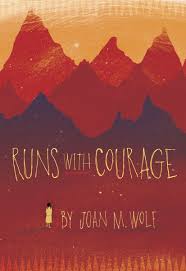The prairie had been very still the day the whites came. The animals stayed tucked in their burrows most of the day. The grasses had not danced in the wind. Clouds had not appeared in the blue sky. It was as if the prairie itself knew of what was to come.
“Sister,” Bear said, pointing. “What is that?”
I looked up from the basket I was mending to see a wagon approach in a cloud of dust. I knew immediately it was the whites.
Before Cousin had died from the meat sickness, she and I often talked about them.
“What do you think the whites look like?” she had asked once as we walked together on the prairie, only a moon before her death.
“They must be very tall. Very powerful,” I answered. It was the white’s leader, the Great White Father, who had forced us to the Great Sioux Reservation. Only someone very powerful could do that.
“They must look like warriors,” Cousin had agreed.
“Yes,” I said. “And if we see them, we will be brave like warriors.” Cousin had nodded.
Cousin had nodded.
Even though we were girls, we knew we could be as brave as our boy cousins. And like the boys, we too wanted to receive our adult names.
I was in my tenth season and had been called by my childhood name of Four Winds since I could remember. Uncle had given me this name when we still lived in the forest of He Sapa, before our move to the reservation. I had received this name because I could hear the words of our ancestors speaking in the winds that moved through the trees.
Cousin’s name had been Laughing Deer because she had long, graceful legs like a deer, and she was always joyful and laughing. Grandfather had given her this name.
I had not talked about the whites with anyone since Cousin had died. But now, they were in front of me.
A white man and woman sat at the front of a large cart pulled by a horse. Their skin was very pale and their clothes were strange. But they were not as tall as I had thought they would be. They looked no more powerful than any of our own warriors.
The woman wore a long black dress that fit tightly at her waist. She had a fabric covering around her head that was tied with a ribbon beneath her chin. The man wore long pants connected to straps on his shirt. The coverings on his feet looked hard and came to a point. They didn’t look anything like moccasins. How could he walk in such things?
I couldn’t see the color of the woman’s hair, but the man’s hair was the same golden shade as the prairie grasses. It gleamed in the light of the sun. “Sister,” Bear whispered from my side, “the man’s hair. Do you see?” My brother was only five seasons and curious about everything. “It is so short.”
Rather than flow down his back, the man’s hair stopped at his shoulders as if it had been cut. No one ever cut their hair unless they were mourning.
“I don’t know,” I whispered. “Perhaps the hair of white men does not grow.”
“Sister,” he asked, “why are they here?”
I shook my head, unable to answer and unable to stop staring as the two whites and he reservation official who had come with them walked into the council lodge.
I longed for Cousin to be by my side again. She would have ideas about this nysterious appearance in our tiospaye. We would talk and giggle until the worry of this unexpected visit would blow away in the breeze. More than anything I wished to hear the sound of her laugh again.
Comprehension Questions
1. What had been her cousin's name?
A. Walking Bear
B. Laughing Deer
C. Lauging Bear
A. The general of the whites
B. Some soldiers
C. The Great White Father
Your Thoughts
Vocabulary
4. List any vocabulary words below.

